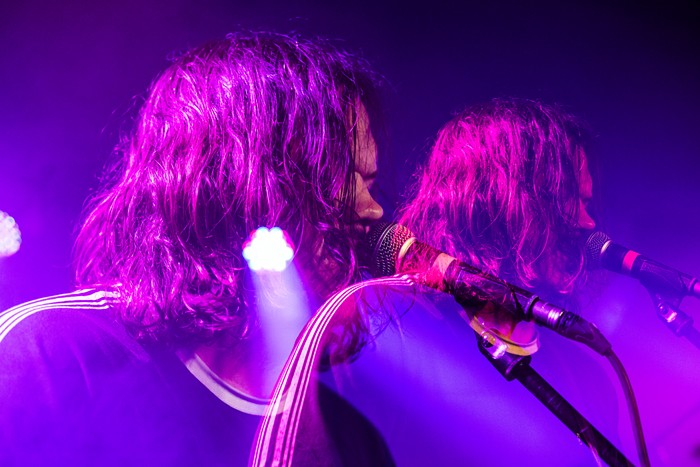A.R.E. Weapons
w/the Fitness, Point Line Plane, Kiss Kiss Kiss
Sun July 20, Crocodile, 9 pm, $10.
New York's come a long way, baby. According to the FBI's recently released Uniform Crime Reports, violence is on the wane in the city. The five boroughs counted fewer robberies, aggravated assaults, and murders in 2002 than in years, and those Travis Bickle-just-mugged-me, gangland-toughs-just-shot-me, waiting-for-my-man- $26-in-my-hand days of the dirty '70s are gone. While that's a bonus for tourism, for those who preferred the flesh pits of Times Square to the current Disney incarnation, it sorta sucks.
That's exactly what makes the danger apparatchiks of A.R.E. Weapons so special. The New York electronic-punk trio can't remember the bad old days--they're barely old enough to remember the '70s--but they know how to glorify them. The three-year-old band is built around such underground lodestones as cult-thriller Repo Man, quarter-sucking arcade games like Space Invaders, and Suicide, the New York City proto-punks who terrorized crowds at renowned Warhol-hangout Max's Kansas City in the '70s. The Weapons, as they call themselves (they say the A.R.E. acronym stands for nothing but the lyrics to their song "A.R.E." say: "I got the A.R.E.: attitude raw energy"), don't shy from discussing their universe on their self-titled Rough Trade debut. It's not a nice place to live. Matt McAuley (guitar), Brain McPeck (vocals), and Paul Sevigny (DJ programmer, manager, demi-celebrity) are all about strutting, being aggro, and reporting what it's really like on the street. The chorus to "Fuck You Pay Me" goes, "Fuck you, pay me, give me my money. Fuck you, pay me, give me my dough." And on "Street Gang," their paean to knife-wielding kids who behave like S. E. Hinton characters, McPeck romanticizes the way New York was: "The night's coming down, the streetlight flickers, here comes the street gang, the beautiful killers," he sings. "Aren't they gorgeous in their black leather jackets? Vision of glory. Let's hear it for America."
The style--a meld of dark, warped beats, roaring guitars, and jailbird sentimentality--comes naturally to them because the Weapons think of themselves as a street gang. They're close friends, onstage and off, and that camaraderie is the catalyst for sweaty, freaky performances. "If you don't feel like if you falter, the people behind you will pick up the slack, then you don't act with confidence," says McAuley, 26, who looks something like a demented basketball coach. He's wearing a headband to keep his long brown hair off his face, sports a Los Angeles Clippers jersey, and is shod in black Nikes.
"The worst is when animosity develops--you could think that about us, but that's wrong, not the right energy," agrees McPeck, 27. His long brown hair is tied back in a ponytail and he's wearing rose-colored aviator shades, which offset the gold crucifix he wears about his neck. "Like in Toronto I got yanked offstage into the pit and started rolling around. Matt thought I was fighting. The next thing I know I see Matt and Paul fucking flying off the stage, Superfly Snuka-style, going, 'Where the fuck's Brain?' In the meantime, I'm down on the ground making out with some chick just because she was being annoying. That's rock 'n' roll--when the audience wants some dirty, sweaty guy rolling all over them."
They're used to inciting controversy, and the critics can't decide whether to love the Weapons or leave them behind. At various points since their inception in 2000 they've been branded a fashion band (they're friends with As Four, an avant-garde clothing design collective), celebrity-suckers (Paul Sevigny is the brother of Boys Don't Cry screen queen ChloË, and the ex-boyfriend of Emma Forrest, a British novelist who enjoyed her 15 minutes back in 2000), and elitist (the music isn't for everyone; neither is the A.R.E. aesthetic). Because they use electronic beats and played several of electroclash-impresario Larry Tee's Brooklyn parties, they were unfairly lumped in with the new wave retread movement, even if their sound was more no wave. "We like Suicide and Throbbing Gristle, sure," says McPeck. "But do we want to be them? No. The idea's not to alienate the audience and get everybody pissed off and have them leave the club. A little antagonism towards the audience keeps people interested, but we want to slowly turn the world to our point of view. We want to make it so you can't deny it."
Dancing along to the songs has become easier as McAuley and McPeck's material has gotten increasingly accessible. And although they're interested in propagating the hard, vicious myths of New York to keep the band's attitude fresh (their us-against-them dispositions are more than just a marketing tool, they're a Weapons-sanctioned way of life), songs like "Hey World" display a surprising empathy for their younger listeners. ("Hey parents! Think about your fucking kids! Remember when you were a kid? All the stupid shit you did?") For a brief moment, A.R.E. Weapons sound inclusive, didactic, and absolutely antithetical to the gritty street culture they represent. In the end, though, the song remains the same: "Most important years of your life, man. It's the difference between being one of them and being one of us. You're either part of the problem, or part of the fucking miserable solution we call 'life.'"


















